Discontent has returned to the streets of Venezuela. After two years of less and less protests in this country, the trend seems to have changed in 2022.
According to the Venezuelan Observatory for Social Conflict (OVCS), there were about 3,892 protests in the first half of this year, an average of 22 per day, which is a 15% increase over the same period last year.
However, unlike in 2019, when the protests were highest for political reasons, in the last decade, it was workers’ rights that supported the most signs of discontent in the first half of 2022. . : 42% of the total.
This change has to do with the conflict between the Nicolás Maduro government’s labor policies and the demands of public officials.
decrease in income
There has been an increase in protests by public officials, especially those working in the health and education sectors, in Venezuela in recent months.
According to the Institute for Advanced Trade Union Studies (Inaesin), there were about 143 workers’ conflicts last July alone.
Behind these protests is an order issued in March by the Office of the National Budget (Onapre, abbreviation for Spanish) that cut civil servants’ incomes by between 40% and 70%, according to Inaesin.
“Onapre has taken on the task of issuing instructions for the payment of workers’ wages and by interfering with it has violated the Constitution, the law and workers’ rights, because when these instructions are implemented, workers’ wages fall”, says Belkys Bolivar, national councilor of the Venezuelan Teachers’ Federation.
He explains that Onapre ignores the benefits provided in the collective agreements of public servants with these instructions and devalues the bonuses and rewards that constitute a significant part of these servants’ incomes. .
“In March of this year, they decided to reduce all our bonuses included in the collective agreement when a salary increase was made by the Manager. They reduced it by 50%, “, he says.
He also emphasizes, for example, that they have reduced severance bonuses, which in his case went from 60% to 30% of the salary, and that the geographic bonus for those working in rural areas has increased from 25% to 10%. , a reduction of more than 50%.
This policy also affected other sectors of public administration. According to Pablo Zambrano, executive secretary of the National Federation of Health Workers (Spanish abbreviation Fetrasalud), Venezuelan health workers also lost more than 50% of their income due to the implementation of Onapre’s mandate.
partial victory
While this latest directive has sparked expressions of dissatisfaction since it went into effect in March, the recent far lower-than-expected holiday pay for education sector workers has only exacerbated the dissatisfaction.
According to Bolivar, the law states that this bonus must be paid based on the worker’s last salary, but the government did so based on the salary in December 2021, rather than taking into account the salary approved last March.
The difference is remarkable. “In my case, they paid me 140 bolivars (R$102) and they should have paid me 2400 bolivars (R$1,750),” Bolivar says.
“It was because of this arbitrariness that the demonstrations started to appear at that time. The salary is not enough to live on. So we returned to the protest and stayed in the protest for more than 3 weeks,” he says.
And they won a partial victory. On August 15, Maduro fired Marco Polo Cosenza, then director of Onapre, and appointed Jennifer Quintero de Barrios, who until then was in charge of the National Treasury.
Shortly after, employees in the education sector began to receive the extraordinary difference from the holiday allowance in their accounts.
However, Onapre’s orders were not revoked, so public officials announced that they would remain in protest so that this rule was repealed and the government could catch any other outstanding debts with them.
hunger wages
Bolivar points out that the inconvenience caused by underpayment of vacation allowance has nothing to do with employees’ vacations, but rather money needs.
“People are always waiting for a vacation to solve their personal problems with this money because we do not use this money to go on vacation. It is not enough to go on vacation with our family,” he says, noting that these resources are used to plug in. budget gaps that they cannot fill with their salaries.
He explains that there are six categories among teachers working in public administration in Venezuela. As a minimum, they earn around 400 bolivars (about R$290) per month and at most around 900 bolivars (about R$655).
“These are unseemly wages. The hunger wages because it is not enough to meet our food needs. We also have health and other needs. When an accident happens, when a family member dies, we have no salary. We have to seek solidarity, ask on social media, ask colleagues and relatives to help us, because the salary doesn’t allow us to meet those needs,” he says.
The situation is no better when it comes to healthcare professionals. Pablo Zambrano explains that an administrative worker earns the equivalent of about R$150 per month, while a doctor earns just over R$50.
With these salaries, they have to face a high cost of living. According to calculations made by the Center for Documentation and Social Analysis of the Venezuelan Federation of Teachers (Cendas), the so-called basket of basic foods, which is the money required to feed a family of five per month, stood at R$2,350 in June. -FVM). ).
Thus, about three or four doctors’ salaries per family would be needed to meet this monthly basket.
what did the government say
Maduro’s government has dealt with this issue cautiously, without revealing prominent figures to the public.
According to the Venezuelan media, during a speech on August 8, the president was interrupted by a woman shouting about something related to Onapre, and Maduro said, “That’s not what you said, and we met face-to-face, if you want. It’s not true. It’s not true. It’s a little bit of what they did on the networks. campaign and not true”.
That same day, during the session of the National Assembly, vice-government Pedro Carreño defended Onapre’s instructions, emphasizing that the main problem was the lack of government money.
“This instruction, which they have demonized, ridiculed in public, has become a kind of retaining wall to stop the claims of the reactionary right, who want to show that there is a problem in Venezuela because workers’ rights are not respected.
The Venezuelan Ministry of Communications was consulted on the matter, but there was no response to the report.
mobile driven
After a staggering 2019, the discontent expressed on the streets of Venezuela has decreased significantly.
According to OVCS data, approximately 16,739 protests took place in Venezuela in 2019. It fell to 9,633 in 2020 and 6,560 in 2021.
Various factors played a role in this decline, from, among others, the marked weakening of opposition forces to the restrictions on mobility caused by the Covid-19 pandemic.
Pablo Zambrano of Fetrasalud assures that the unions have remained mobilized all this time, but acknowledges that the recent momentum of the protests has something to do with some of the changes in recent months.
He points out that they are not satisfied because, in addition to enforcing Onapre’s mandates restricting workers’ rights, the situation is made worse as the government’s response to the complaint is persecution, intimidation and criminal treatment of workers.
“The government’s talk of economic recovery has also created discontent, but this is not felt among workers in the government, but workers, salaried workers currently do not have enough money to live with dignity, to support their families,” he notes.
Zambrano argues that a key element in the resurgence of the protests was that the health and education sectors came together to jointly support the protests, but that what they demanded is concrete government responses to workers’ demands without further flags.
“We’ve managed to get workers to respond to demand, beyond the party, beyond ideology, beyond discussions of capitalism or communism, left or right – these already exhausted rhetoric. Here, right now, whatever their thoughts, people say the government is doing wrong, big mistakes. “They know what he is doing and that he has a policy against the Venezuelan working class.”
– This text was originally published at https://www.bbc.com/portuguese/internacional-62668771.
source: Noticias


